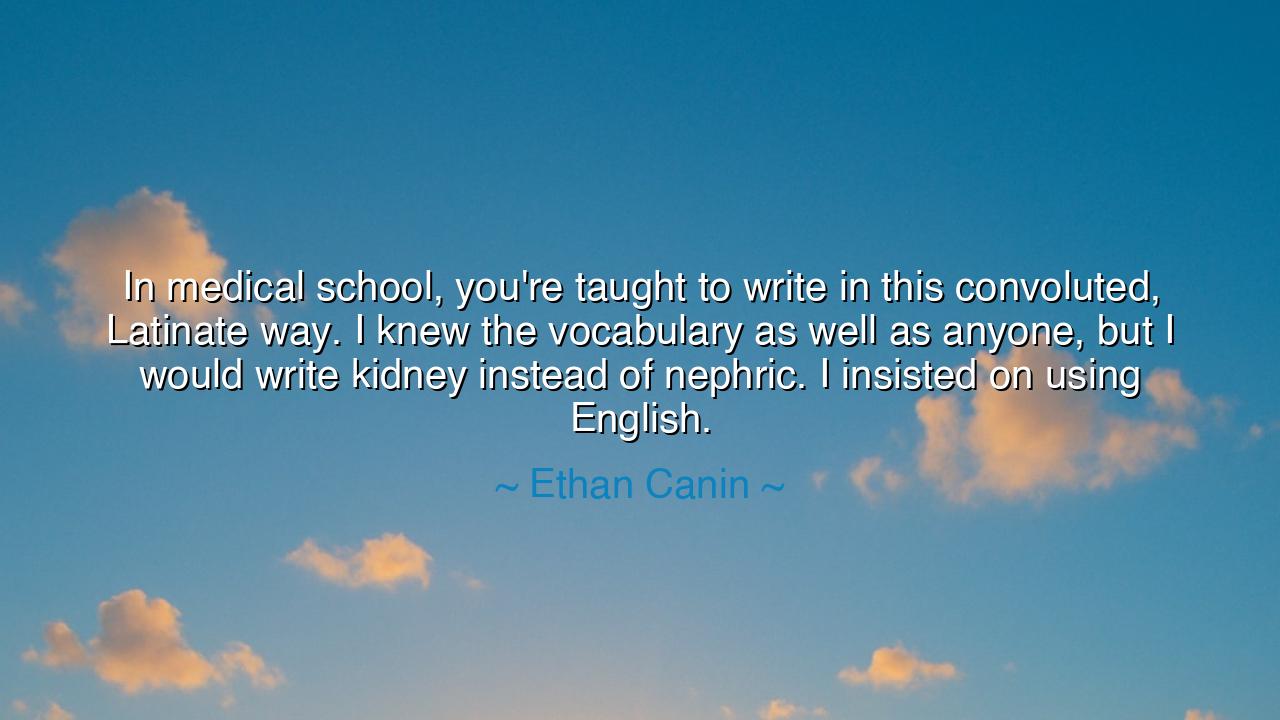
In medical school, you're taught to write in this convoluted
In medical school, you're taught to write in this convoluted, Latinate way. I knew the vocabulary as well as anyone, but I would write kidney instead of nephric. I insisted on using English.






The words of Ethan Canin shine with the quiet courage of simplicity: “In medical school, you’re taught to write in this convoluted, Latinate way. I knew the vocabulary as well as anyone, but I would write kidney instead of nephric. I insisted on using English.” In these few words, he speaks not merely of language, but of truth—of the eternal struggle between clarity and pretension, between communication and concealment. His rebellion was not against learning, but against the veil that learning too often weaves between the wise and the world. In choosing the plain word over the ornate, he chose honesty over vanity, accessibility over elitism, and humanity over hierarchy.
In medical school, as in many disciplines, language becomes a fortress—dense, intricate, and often impenetrable. It is built not only to define, but to distinguish—to separate the learned from the unlearned, the healer from the patient. Canin, both physician and writer, saw the danger in this. For what use is knowledge if it cannot be shared? What good is medicine if the patient cannot understand the words of their own healing? By saying “I insisted on using English,” he declared that the purpose of wisdom is not to elevate oneself above others, but to lift others into understanding. His act was both humble and revolutionary, for simplicity is the truest form of mastery.
The origin of his defiance lies deep in the spirit of all who seek to bridge knowledge with compassion. The ancients knew that language was power—yet they also knew that the greatest teachers spoke in the tongue of the people. Socrates taught barefoot in the marketplace, not in the halls of scholars. Jesus spoke in parables of seeds and fields, not in the rhetoric of priests. Confucius taught that wisdom lies in clarity, for only the clear word reaches the heart. Canin’s words are born from that same lineage: a rejection of obscurity in favor of illumination. His choice to say kidney instead of nephric is more than linguistic—it is moral. It is the physician’s duty to heal not only the body but the fear that comes from not understanding one’s own condition.
Consider the story of Ignaz Semmelweis, the 19th-century doctor who discovered that handwashing could save countless lives. When he tried to communicate his findings, he wrote in terms so dense, so Latinate, that his peers dismissed him. His truth was lost in the fog of his own eloquence. It was only later, when others expressed his discoveries in simpler words, that the world understood—and millions were spared. So too does Canin’s insight warn us: that the grandeur of expression can become the enemy of meaning. The more intricate the words, the further they may drift from the pulse of truth.
There is a subtle heroism in Canin’s insistence. In a world that rewards complexity, it takes courage to be plain. The scholar seeks to impress; the teacher seeks to express. He chose the latter, and in doing so, reaffirmed that true mastery lies not in obscuring the message, but in revealing it. To say kidney instead of nephric is to meet the listener where they stand—to acknowledge that understanding is not a gift from the learned to the ignorant, but a shared act of humanity. His is a lesson for every profession: that clarity is compassion, and that to simplify is not to diminish, but to dignify.
His quote also reveals something of the poet within the doctor. The vocabulary of medicine may be technical, but the language of healing is universal. When Canin “insisted on using English,” he was also insisting on empathy—on the bridge between doctor and patient, between intellect and emotion. For every medical term hides a human story, every diagnosis a trembling heart. To use plain speech is to honor the person behind the ailment, to say, “I see you not as a case, but as a soul.” In that choice of language lies the oldest kind of medicine—the kind that heals through understanding.
So, my child of knowledge, take this lesson deeply into your heart: whatever your craft, speak so that others may understand. Do not mistake obscurity for wisdom, nor jargon for authority. The truest teacher makes the complex simple; the false teacher makes the simple complex. Whether you are a doctor, a scholar, or a creator, remember that words are tools of service, not ornaments of pride. To use them well is to honor those who listen.
For in the end, Ethan Canin’s words remind us of an ancient truth: that language is a mirror of the soul. When it is clear, it reflects sincerity; when it is clouded, it hides arrogance. Choose clarity, for it is the path of compassion. Choose simplicity, for it is the mark of mastery. And when you speak—whether in science, in art, or in life—let your words heal as surely as any medicine, carrying truth not to the mind alone, but to the heart of all who hear.






AAdministratorAdministrator
Welcome, honored guests. Please leave a comment, we will respond soon